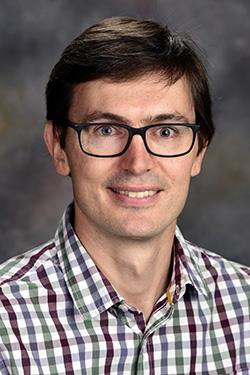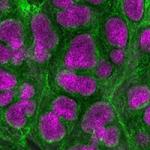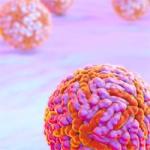
Marcos Morgan, Ph.D.
Stadtman Investigator
Reproductive & Developmental Biology Laboratory/Male Reproduction & RNA Biology Group
NIEHS
Research Topics
Morgan’s group seeks to understand the role of post-transcriptional gene regulation during germline development. Normal tissue development depends on RNA binding proteins and non-coding RNAs; however, more recently, modifications to the RNAs have also been shown to be critical in this process. Dysregulation of gene expression at the post-transcriptional level leads to growth defects and cancer.
Group members study non-templated addition of nucleotides to the 3' end of RNAs, a critical type of post-transcriptional modification. These 3' additions of nucleotides are catalyzed by enzymes known as terminal nucleotidyl transferases (TENTs). By systematically studying TENTs using animal models and advanced molecular biology techniques, Morgan and his group will begin to understand the physiological relevance of terminal modifications in tissue development. Their ultimate goal is to bridge the gap between the mechanistic knowledge of gene regulation at the cellular level and the principles that define multicellular organization.
Biography
Morgan graduated from the University of Buenos Aires in 2005 with a degree in biology and completed a doctorate in molecular biology in 2011. For his postdoctoral studies, he held a joint appointment at the European Molecular Biology Laboratory (EMBL) in Italy and the European Bioinformatics Institute (EBI) in the United Kingdom. During the final years of his postdoctoral fellowship, he joined the MRC Centre for Regenerative Medicine in Edinburgh, Scotland. Morgan joined NIEHS as an NIH Stadtman Tenure-Track Investigator June 2019.
Selected Publications
- Baptissart M, Papas BN, Chi RA, Li Y, Lee D, Puviindran B, Morgan M. A unique poly(A) tail profile uncovers the stability and translational activation of TOP transcripts during neuronal differentiation. iScience. 2023;26(9):107511.
- Gupta A, Li Y, Chen SH, Papas BN, Martin NP, Morgan M. TUT4/7-mediated uridylation of a coronavirus subgenomic RNAs delays viral replication. Commun Biol. 2023;6(1):438.
- Gupta A, Papas BN, Baptissart M, Morgan M. Quantification of Poly(A) Tail Length and Terminal Modifications Using Direct RNA Sequencing. Methods Mol Biol. 2024;2723:253-266.
- Morgan M, Kumar L, Li Y, Baptissart M. Post-transcriptional regulation in spermatogenesis: all RNA pathways lead to healthy sperm. Cell Mol Life Sci. 2021;78(24):8049-8071.
Related Scientific Focus Areas
This page was last updated on Thursday, September 19, 2019




